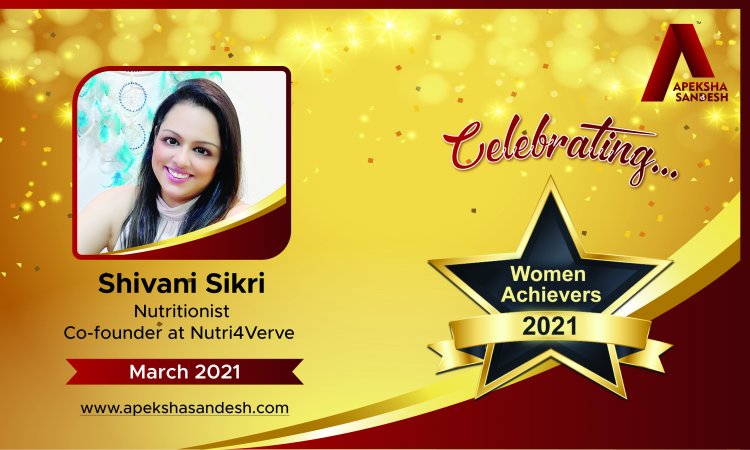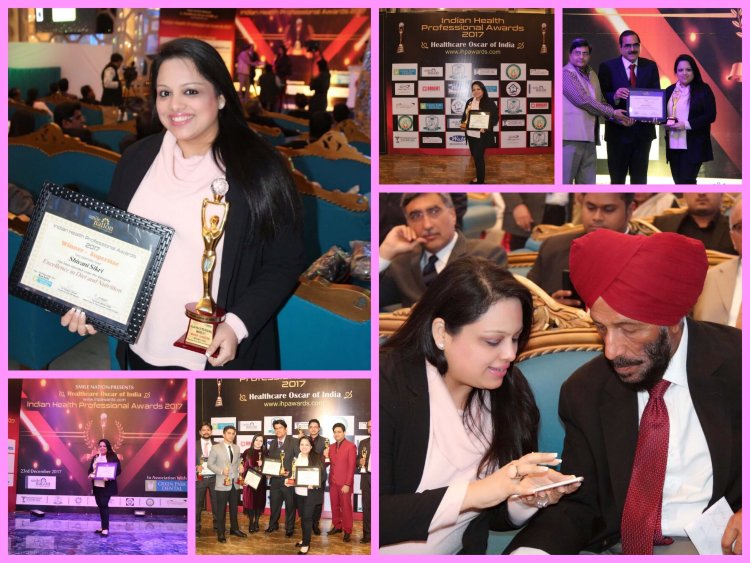It is important that women support and encourage one another: Shivani Sikri

Shivani Sikri is an internationally renowned award-winning nutritionist with extensive experience of more than a decade. With her expert counselling, she has transformed thousands of lives from millennials to golden-agers.
As a Chief Nutritionist and Co-founder at Nutri4Verve, Shivani recommends customised Indian versions of international diets like Keto Diet (Veg/ Non-Veg), Intermittent, Paleo, and other top international fat loss targeting diets, in addition to well-balanced metabolic and combination based nutritionally rich diets so that the fat loss goals of her clients are easily attainable and everlasting.
Her forte includes therapeutic diets with emphasis on diabetes, thyroid, cholesterol, PCOD/ PCOS, post-pregnancy, and other metabolic diseases through lifestyle management.
Through Nutri4Verve, her online clinic, Shivani continues to work towards its objectives along with a circle of experts to act as life architects, helping people to restructure their lives, together with working towards the company’s motto is, ‘Eat Healthy Look Great Live Longer!’.
Shivani has been recognized as the ‘Best Dietitian in Delhi’ at the International Healthcare Summit. She was awarded as the ‘Superstar: Excellence in Diet and Nutrition’ at the Indian Health Professional Awards which is also acclaimed as The Healthcare Oscar of India. Shivani was featured in Kilkari, a TV Health-Info Series as a nutrition expert for TATASKY's launched Active health channel – Famhealth.
She has conducted several workshops and seminars for ‘Indian Oncology Foundation’, an NGO headed by Dr. Ashok Vaid as a guest speaker and nutrition expert. She has also extended her services for free medical cum health checkup camps, including special occasions such as Independence Day and World Cancer Day, etc.
She was among the eminent speakers for the talk, ‘Food and nutrition during COVID’ on behalf of the Government of India, ROB Dehradun, in co-operation with the Ministry of Information and Broadcasting. She was also part of an expert talk on ‘Poshan Abhiyan’ as a guest speaker.
Apeksha Sandesh had an exclusive chat with the Chief Nutritionist and Founder of Nutri4Verve, Shivani Sikri. Check out the excerpts of the conversation wherein she talks about how women can improve their life by adopting a healthy lifestyle, the struggles of women, the right age for marriage and pregnancy, and much more!
How has been your journey so far as a nutritionist since the time you began?
After completing my master’s in business marketing, my passion brought me to the field of nutrition and wellness. Honestly, before becoming a nutrition expert, I struggled with my post-pregnancy weight. Me becoming a nutripreneur was a development that wasn't clear at the beginning in 2010. However, my determination to reach my goals became my motivation. I attained the required qualifications and can easily say that becoming a nutritionist was one of the best decisions of my life I ever made. I have always enjoyed healthy eating and am continually interested in everything related to health, vitality, and happiness. Thus, I decided to work as a holistic health and nutrition advisor.
For me, it is not a job, but a calling. I look forward to many new, exciting, and varied topics in nutrition and wellness every day. I love it and have a lot of fun doing it. I always wanted to do work with people and help them in their situation, advise them and integrate a more conscious and healthier lifestyle into their everyday life. So, I feel really happy when my clients experience success in their endeavours towards health. It is so nice when they tell me beaming with joy that they were able to reduce their blood pressure tablets or their blood sugar levels have been stable for weeks or they fit into the old jeans from 15 years ago. It makes me happy to see that people can achieve their personal goals with my support and feel healthy and well again.
There are so many nutritionists in the market, so what makes you or Nutri4Verve different from the rest?
When we started Nutri4Verve in 2010, its foundation was laid on ethics and we decided to have personal connections with our clients. And that has been the prime reason for Nutri4Verve’s many folds growth over the years. All our diet programs are customized based on the individual requirements of each client that revolve around nutrition, exercise, sleep cycles, as well as emotional wellness. We don’t copy-paste things.
Further, consistent research and developing newer diet strategies, regular training, and upgrade of team knowledge helps us understand and cater to each client’s specific requirements. It helps us attain results and happy clients.
A lot of brands these days use the term ‘organic’, but it seems like a trend wherein in reality there is nothing organic about the product. What is your opinion on the same?
Organic means environmentally friendly production, assured quality, and a clear conscience. Mostly yes - but not always! I would say it as a biological jumble.
On the other hand, regulators are in a tug-of-war with lobby organizations. As a result, the term ‘organic’ today often appears like a jumble of meanings, legal provisions, and seals. Corporates benefit from the fact that it is not always clear to consumers which seals they can rely on.
The dictionary meaning seems to be relatively clear: organic production means no artificial elements flow into the value chain, so the production and raw materials are natural. It is often also called ecological farming. So, no pesticides, insecticides, synthetic chemicals, or any unnatural preservatives should be used in a product or produce.
Regulatory bodies in India such as INDIA ORGANIC have specific guidelines before the use of their seal. The seal is only awarded to those who comply with India’s Organic Legislation on organic farming. The organic seal stands for clearly defined, legal requirements in production and processing. These directives stipulate which fertilizers, feed, and pesticides are permitted for organic farming; how many animals can be kept in how much space; how many additives are allowed, etc. This clearly distinguishes the products from conventional products.
Thus, only by mentioning ‘Organic’ on packaging could be a marketing gimmick by organizations and hold lesser value unless there are duly certified by national or international regulatory bodies. As a customer, looking to purchase genuine organic produce or products, one should check the label for the ‘Certified Organic’ seal of the regulatory body along with the respective level/category to ascertain the authenticity.
Do you have any suggestions for our readers to recognize the right organic food from the brands available?
You can recognize organic food by the fact that it has either the term ‘organic’ or the term ‘eco’ on it. Both terms are protected by law. This means you can only use them if you comply with the strict regulations for organic farming. However, similar terms appear on some products. For example, environmentally friendly, close to nature, untreated or controlled. These terms are not protected. Every manufacturer can use these terms and there are no rules for this. With these terms, the consumer knows nothing about how the products were made. These products may or may not organic.
According to the Delhi-based Indian Council for Research on International Economic Relations (ICRIER), such foods that are labelled organic but not certified cannot be considered safe. The ICRIER also mentioned the need for a uniform standard for organic foods in its last report. Now, the Food Safety Standards and Authority of India (FSSAI) has launched the Food Safety and Standards (Organic Foods) Regulations 2017 along with the unified logo for organic food products, supported with the tagline ‘Jaivik Bharat’. All organic foods certified under this logo also need to convey full and accurate information on labels about the organic status of the food. The ‘Jaivik Bharat’ logo is henceforth recognized as a mark of quality assurance given by the above-mentioned certification bodies in India or any other bodies recognized by FSSAI.
Given that the term ‘organic’ attracts premium pricing, there are huge incentives to game the system and sell pretty much anything under the umbrella term.
But the era of the Wild West in the organic realm may be coming to an end. On 1 January 2019, India joined a group of roughly 50 countries that mandates clear and legible consumer-friendly labelling for organic products.
Henceforth, no person will be able to manufacture, pack, sell, market, or otherwise distribute or import any organic food unless they label the package with complete and accurate information regarding the organic status of the product. Also, any such product should carry a government quality assurance mark and the new Jaivik Bharat logo, which is meant to distinguish organic products from non-organic ones.
Do you think our education curriculum in the schools focuses enough on the importance of nutrition? Or is there anything else that you would like to suggest?
I believe there is a huge scope of improvement in our education curriculum in schools or even colleges on the importance of nutrition, not only academically but also practically. We all learn and discuss a balanced diet, the importance of carbs, proteins, vitamins, and minerals, etc. over the years of our academic curriculum. However, we now need to add important topics like the need for organic eating, hazards of high sugar content, hazards of junk food, and other co-related topics. The latest researches on well-being should now become part of the curriculum.
I believe school kids should be taught to read and understand the ‘food labels’ on packaging so that they understand what is going inside them and what effects (good or bad) will the food give to them. This sense of self-understanding will only help us prevent ever-rising cases of diabetes, blood pressure, PCOS, and other lifestyle diseases among children. For this, the school should conduct regular workshops or collaborate with nutritionists or hospitals to make kids more aware.
As an activity, a school garden can be introduced, where kids can grow vegetables and herbs of their choice and use them in competitions at school. Even healthy cooking techniques and methods are very important to be learned as their effects on how the nutrients from the food are going to get absorbed. The assimilation of nutrients also depends on the combinations and methods of cooking.
Last but not the least, school canteens should serve healthy meals only. Junk food should be strictly banned, along with all sugary drinks and colas.
In terms of nutrition and healthcare for women, do you think the existing programs introduced by the government need enhancement? Any suggestions to the government?
Governments have a role to play in both increasing access to healthy foods and reducing access to unhealthy foods. To date, there are more access-enhancing strategies than those that might reduce access to unhealthy foods. Now is the need that government should also focus on strategies that reduce access to unhealthy foods, as these potentially may have more of an impact in reducing obesity than increasing access to healthy foods. For example, restricting access to sugar-sweetened beverages in after-school community programs may have more of an impact on reducing the consumption of excess calories and weight gain in youth. The government should push for more organic cultivation and produce and strictly curtail excess use of pesticides and other chemicals.
The government can introduce healthy eating strategies and policies and action steps like;
- Improve access to and consumption of healthy, safe, and affordable foods.
- Reduce access to and consumption of calorie-dense, nutrient-poor foods.
- Raise awareness about the importance of healthy eating to prevent childhood obesity.
Moreover, the government should create effective interventions to improve women’s and adolescent girls’ nutrition. Taking such action not only improves the health of girls and women today also has far-reaching intergenerational effects that can help our country develop.
Preventing malnutrition requires a political commitment. Public health systems of the government need to prevent and treat micronutrient deficiencies, encourage households to meet the dietary needs of women and adolescent girls throughout their lives, and ensure their access to high-quality health services, clean water, and adequate sanitation.
Policymakers should also address women’s low social status and ensure that girls have access to education, which should include nutrition information. Such policy measures can help increase women’s age at first pregnancy, an important determinant of maternal health and child survival, and can encourage women to space their births.
What is the biggest struggle of a woman today in India in terms of maintaining their health and staying fit?
The female gender faces many challenges. Women are known to be superheroes of everyday life as ‘all-in-one’ role that includes as a housewife, mother, wife, lover, nurse and much more, puts women under high pressure of expectation, and ultimately while fulfilling all their responsibilities, they miss taking care of their health.
Marriage, pregnancy, etc. everything has its own time and if takes place at the right age, it is good for a woman. How far is it true?
Age as a number is less important than age as experience. I believe that there isn't necessarily the best age to get married, but there is the best time to get married. The best time to get married is when you feel comfortable and confident in your job and personal life. If you were to give yourself an exact age, you might find that you settle for whomever you're with at that age.
Next, many women wonder what the best age to get married or getting pregnant is. There are many statistics and studies about high-risk pregnancy – getting pregnant at 30, 40, or even 50? In the end, however, the answer to the question depends on each individual which very much depends on their health habits and lifestyle. Always remember, a woman must decide when and at what age she is ready for a child.
Even if one cannot generally determine the right time for the first or next child, there are a few things you should know about the relationship between age and pregnancy.
Biologically, it is best to get pregnant between 20 and 29 years. Because fertility decreases from the age of 30 and is only an average of 25 percent at the age of 35. In the mid-30s it drops to an average of 25 percent. The likelihood of pregnancy decreases with increasing age. At an age of 35, it is less than 20 percent, at the age of 38 it is less than 15 percent. From the age of 35, a woman is considered to be late giving birth, and pregnancy is considered as a risky pregnancy, as the risk of genetic defects in the child increases from this age. The risk of maternal illnesses during pregnancy such as gestational diabetes or high blood pressure also increases from the age of 35.
I would still emphasis that you know what is good for you and what you want for yourself. Don't be too dependent on statistics and averages. Many things can be normal and right when it comes to family planning. Every woman, mother, and family are different and special.
Would you like to share three important tips for our women readers towards their healthcare and staying fit?
My three important mantras for women healthcare and staying fit are,
- Focus on Right Nutrition and eat a healthy diet. Eat as close to a natural foods diet as you can. Include a variety of fresh fruits and vegetables and fewer processed foods. Eat whole grains and high-fiber foods and choose leaner cuts of meat, fish, and poultry. Include low-fat dairy products in your diet. Healthy eating will help you maintain a proper weight for your height, which is important because being overweight can lead to several illnesses.
- Exercise. Heart disease is the leading cause of death among women across the world now. Regular exercise can help keep your heart healthy. Exercise at least 30 minutes a day, three to five days a week, if not every day. Aerobic exercises (walking, swimming, jogging, bicycling, dancing) are good for women’s health in general and especially for your overall fitness.
- Manage Stress and focus on Mental Wellness. No matter what stage of life — daughter, mother, grandmother — a woman often wears many hats and deals with a lot of pressure and stress. Take a few minutes every day just to relax and get your perspective back again. It doesn’t take long, and mental health is important to your physical well-being. You also can manage stress with yoga, exercise, relaxation techniques, or meditation.

What main change would you like to see in young girls in the next generation?
The next generation women of India are already leading the way but still, many might need help. I would again emphasize on self-love, self-care, and awareness. Parallelly, education is important, especially to a girl. It allows you to develop confidence in yourself, showcase your talent, and speak for your rights. If the woman is not educated, she will fail to understand her rights and responsibilities. Also, as it is said, when you teach a man, one person gets educated and when you teach a woman, a family is educated.
The new generation of women should be aware of their unique identity and ability to address a need. They should be active and vocal in any space where you want to see change. Young women should raise awareness and mobilize others around a cause, modeling the power of young changemakers. Moreover, a woman must stand up for another woman. That is something we all must do. It is important that women support and encourage one another instead of continuing to form coalitions with male power. If women do not work together, then they weaken each other. For this to happen, women also have to deal more openly with conflicts and same-sex competition perceive as less negative, in the sense of mutual appreciation and skill recognition.
International Women’s Day celebrates the scientific, political, economic, and social achievements of women. In your experience as a successful woman, what is its significance?
Since 1911, we have been celebrating International Women's Day. The day is intended to celebrate the achievements of the women's rights movement to date, draw attention to existing discrimination and inequalities and encourage people to work for gender equality.
Women across the world contribute to society, the economy, science, and other sectors in many ways — and have always done so. These contributions, however small they may seem, add up and are invaluable. But women’s work and accomplishments often remain hidden and go unrecognized and unappreciated. We need to recognize the contributions of all women, uplift those who need support and be grateful to all the women who strived for gender equality even before we were born.
We need to have conversations with our friends, co-workers, peers, and leaders at our workplaces and in society to highlight issues that need urgent attention. We need to speak up when we see inequalities, whether they involve ourselves or others, and insist that they are addressed. It is crucial that we work together with our male colleagues and partners to accomplish these goals.
I believe every day should be treated as a Women’s day. Also, I think, we don’t need a specific day to showcase their achievements. All glories and achievements should be celebrated all year.
This day makes us pause and reminds us that we have a long way to go still to get to gender equality and that we stand on the shoulders of so many incredible women and men who have fought to create a world that values people equally regardless of sex and sexual identity.
Apeksha Sandesh congratulates Shivani Sikri for her contribution and commitment to helping people lead a healthy lifestyle her works, and wishes her all the best for her future endeavours!















































